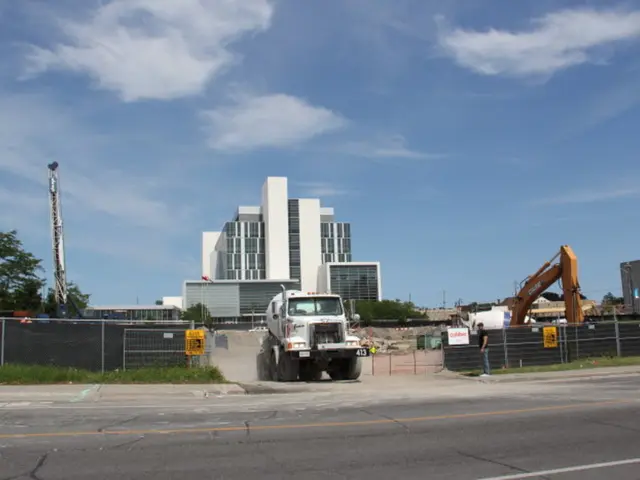Considering Secession
Contemplexation: The Case for Alberta's Future Course
In the heart of Western Canada, a growing sentiment stirs among Albertans. They're frustrated with federal policies, particularly those affecting the oil and gas industry, and see separating from Canada as a potential solution. Pushed by the controversial actions of their Premier, Danielle Smith, Alberta's secessionist dreams are gaining traction, despite lingering uncertainties and reservations held by many [1][2].
Grievances and Motivations
Sky-high tensions are palpable among Albertans as they point fingers at the federal government for fostering policies they deem economically destructive. The strife stems from oil industry hurdles, such as difficulties in developing pipelines, and stricter emissions caps, set in place without proper consultation [2][3].
Interestingly, the threshold for initiating a referendum on Alberta's secession is now significantly lower, thanks to a controversial bill tabled by Premier Smith. This could accelerate the process and lead to a potential vote on the issue [2].
Preserving Federalism and Unity
Critics of Alberta's potential secession argue that it plays on emotions rather than addressing root problems. They stress the importance of preserving national unity and the federalist system [2].
Indigenous leaders, including Piikani Chief Troy Knowlton, voice concerns that any secession statement must first secure the consent of Indigenous peoples. Given that Indigenous treaties pre-date the creation of Alberta, their participation in the process adds significant ethical and legal complexity [1][2].
Economic Implications
The financial ramifications of Alberta's secession are uncertain, with potential outcomes ranging from severe instability to new economic opportunities. The process would involve complex negotiations with the federal government, as per the Clarity Act, which demands a clear majority and clear question for any province to successfully separate [3].
A Patchwork of Opinions
Canada's future is at a crossroads as opinions on Alberta's secession remain divided. Though some may see secession as an escape from unfair policies and uneven wealth distribution, others believe Alberta's integral role within the federation must be leveraged for better policy-making [3].
Authentic opinions are shaped by personal experiences, interpretations, and assessments of facts, data, and events. More details
Additional Insights
- Impact on the Rest of Canada: The economic contribution of Alberta's oil and gas industry is substantial, and its absence could lead to repercussions for the entire country, both economically and politically [2].
- Indigenous Collaboration: Meaningful dialogue and collaboration with Indigenous communities are crucial for a fair and ethical secession process to take place, if it proceeds [1][2].
- Clarity Act: The Clarity Act sets clear standards for any separation process, aiming to minimize confusion, prevent coercion, and ensure the self-determination of each province [3].
- Alberta's Premier Danielle Smith is driving the secessionist movement, pushing for a potential solution to frustrations with federal policies, particularly in the oil and gas industry.
- The federal government is under fire for policies seen as economically destructive by Albertans, such as difficulties in developing pipelines and stricter emissions caps.
- The threshold for a referendum on Alberta's secession has been lowered due to a controversial bill tabled by Premier Smith, potentially accelerating the process.
- Preservation of national unity and the federalist system is a key concern for critics of Alberta's potential secession.
- Indigenous leaders, like Piikani Chief Troy Knowlton, demand the consent of Indigenous peoples in any secession statement, given that treaties predate the creation of Alberta.
- The financial ramifications of Alberta's secession are uncertain, with potential outcomes such as instability or new economic opportunities.
- Kadziewicz, a resident of Toronto, may see secession as an escape from unfair policies and uneven wealth distribution, while others believe Alberta's role within the federation should be leveraged for better policy-making.
- Public services could face disruptions should Alberta secede, adding to the uncertainty of the underlining implications for Canada as a whole.
- Alberta's secession could result in repercussions for the entire country, both economically and politically, given the substantial economic contribution of its oil and gas industry.
- In a divided public opinion, some believe dependence on the federal government for various services and policies make separation impractical.
- Migration patterns may shift if Alberta secedes, presenting unique challenges that must be considered in any separation policy and legislation.
- The secession debate is intertwined with war-and-conflicts, as some argue that a separate Alberta could potentially renege on sharing military resources with Canada.
- Sporting communities, including football, basketball, hockey, golf, tennis, and mixed-martial arts, could be impacted by Alberta's secession, with players and teams potentially faced with changes in their competitive leagues.
- Sports betting regulations may also be affected by Alberta's separation, creating additional complexities in policy-and-legislation.
- Weather forecasting and auto-racing industries could experience disruptions due to Alberta's potential secession, as cooperation across borders is essential for effective operations.
- European leagues, NCAA basketball, NHL, racing, premier league, NBA, and grand prix events might need to revise their rules and agreements within and across jurisdictions following Alberta's possible separation.
- Horse racing and WNBA tournaments may need to reconsider their partnerships and organizational structure, should Alberta secede from Canada.
- Car accidents, fires, and crimes across borders could present challenges for law enforcement and justice systems in handling cross-jurisdictional incidents.
- The impact of Alberta's secession on general news, crime and justice, and sports analysis must be carefully assessed, as the implications extend beyond the province's borders.
- In the broader context, the weather patterns and climate changes could have unforeseen consequences for Alberta and Canada as a whole, if the province decides to secede.








